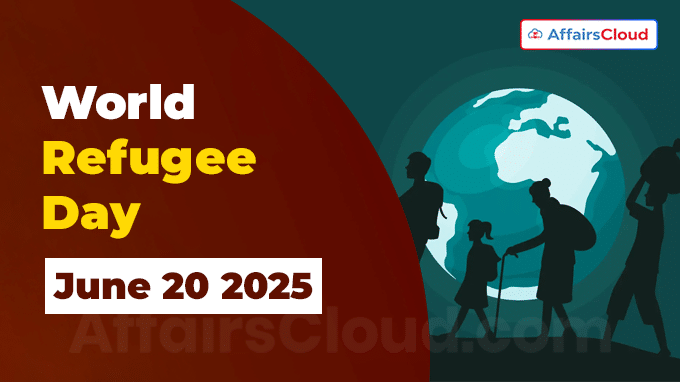 The United Nations (UN’s) World Refugee Day is annually observed on June 20 to honor refugees worldwide and recognize their immense strength and courage in fleeing conflict or persecution.
The United Nations (UN’s) World Refugee Day is annually observed on June 20 to honor refugees worldwide and recognize their immense strength and courage in fleeing conflict or persecution.
- World Refugee Day helps build empathy and awareness about the hardships refugees face due to conflict, persecution, and forced displacement.
- The annual observance is led by the Office of the United Nations High Commissioner for Refugees (UNHCR), headquartered in Geneva, Switzerland, in collaboration with key partners such as the World Health Organization (WHO) and various other international organisations.
Theme:
The theme for World Refugee Day 2025 is “Solidarity with Refugees”, emphasizing the need for united action to support displaced individuals.
Refugee Week 2025:
Refugee Week takes place every year in June around World Refugee Day. In 2025, Refugee Week runs from June 16 to 22.
Background:
i.In December 2000, the UN General Assembly (UNGA) adopted resolution A/RES/55/76, designating June 20 as World Refugee Day.
ii.The inaugural World Refugee Day was held on June 20, 2001.
iii.The 2001 observance held special significance as it marked the 50th anniversary of the landmark 1951 Convention Relating to the Status of Refugees.
Note: World Refugee Day coincides with Africa Refugee Day, observed on June 20 by the Organization of African Unity (OAU) (now the African Union (AU)), headquartered in Addis Ababa, Ethiopia.
Who is a Refugee?
A refugee is defined as an individual compelled to leave their country of origin due to a well-founded fear of persecution, or because of war, conflict, widespread violence, or events seriously disturbing public order.
1951 Refugee Convention:
i.The cornerstone of international refugee protection is the 1951 Convention Relating to the Status of Refugees, supplemented by its 1967 Protocol:
ii.A diplomatic conference in Geneva, Switzerland, adopted the Convention in July 1951.
iii.It provides the universally accepted definition of a refugee and outlines the legal protections, rights, and assistance refugees are entitled to receive. It also specifies refugees’ obligations towards their host countries.
iv.Initially, it focused on protecting European refugees in the aftermath of World War II.
v.Adopted on 4 October 1967, this Protocol removed the Convention’s initial geographic and time-based limitations. This crucial amendment expanded the Convention’s application globally, ensuring protection for all persons fleeing conflict and persecution, regardless of location or date.
vi.Currently, the 1951 Refugee Convention and its 1967 Protocol remain the principal international legal instruments safeguarding refugees worldwide.
UNHCR’s Global Campaign:
i.The UNHCR launched the “Hope Away from Home” campaign in 2023.
ii.This campaign seeks to translate global solidarity into action, focusing on safe access, human rights, legal reforms, durable solutions, and support to host countries.
iii.A survey conducted by Paris, France based Ipsos and Geneva, Switzerland based UNHCR as part of this campaign revealed that 73% of adults globally support the fundamental right to seek safety from war and persecution.
Global Displacement Statistics:
i.According to the Global Trends report by the UNHCR, as of April 2025, an estimated 122.1 million people were forcibly displaced worldwide, marking a slight decline from 123.2 million at the end of 2024.
- More than 70% of refugees live in low- and middle-income countries, mostly in urban settings, where they face legal, financial, and structural challenges in accessing healthcare.
- This includes over 47 million children, many of whom experience interruptions in health services, education, and protection.
ii.This includes 43.4 million refugees, 63.3 million internally displaced persons (IDPs), and 6.9 million asylum seekers.
iii.The primary drivers of displacement are ongoing conflicts in Sudan, Myanmar, and Ukraine, along with persecution in Syria and Afghanistan.
iv.Among the displaced, approximately 47 million are children, many of whom face severe disruptions in education, while 73% of all refugees originate from just five countries: Afghanistan, Syria, Venezuela, Ukraine, and Sudan.
About United Nations High Commissioner for Refugees (UNHCR):
President – Filippo Grandi
Headquarters – Geneva, Switzerland
Founded – 1950




